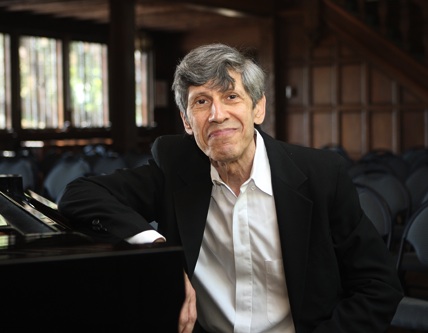Pianist Holzman brings skill and personal insight to music of our time
Pianist David Holzman spoke to the audience before and during his performance Sunday afternoon at Spectrum, offering ideas and insights about the pieces he was going to play. But the most interesting and memorable thing he said was about himself—how as a solo performer he is often full of doubts about the quality and value of what he is doing. The antidote, he said, was the affirmation he received from audiences, telling him that he was doing something right. Sunday, he did everything right.
Holzman has been making music for decades, and has come to be known by that ridiculous cliché, a 20th-century music specialist (should we think of Liszt as a 19th-century music specialist?). He plays the music of his time, a time that is full of excellent, meaningful writing for the piano.
Holzman is one of the leading interpreters of the music of Stefan Wolpe, and he played two of Wolpe’s Songs Without Words to end the recital. Before that, he played substantial pieces from Aaron Copland, Roger Sessions, and Ursula Mamlok, and recent works from Arthur Kreiger and James Ricci. What was notable was the high quality of all of the music and playing, and what was unremarkable was how unobtrusively all the musical thinking fit into the entire classical tradition, new and old.
Across all the styles, everything was expressive and often quite personal. Before he sat down to play Copland’s Piano Sonata to start the program, Holzman mentioned that Copland and playwright Clifford Odets had been lovers, and that the proud, balanced final Andante movement was a “wonderfully deep profession of love” from Copland to Odets.
That was certainly an ear-opening way to think about the music, and Holzman channeled his understanding through his hands, playing with a mix of the clarity and precision that Copland’s music inherently calls for, as well as a warm soulfulness. There was a bright extroversion to the interpretation, a contrast to the moody approach commonly heard, and an attention to details, like the subtle gesture toward Ives’ “Concord” Sonata in the Vivace movement. The Andante was dignified, played without exaggeration.
Holzman then premiered Ricci’s Intermezzo. In the program notes, Ricci explained that he took an intuitive approach to writing the music, exploring the pathways of his subconscious and the sound of the piano. It initially presents itself as an atonal work, but quickly and smoothly becomes the fundamentally romantic reverie of Ricci’s technical approach. The music seems to sound just the way it should and, in Holzman’s performance, was completely absorbing.
Very different in style but just as finely played was Session’s 5 Pieces for Piano. This set is from later in the composer’s life, when his music was primarily, but not completely, atonal. The 5 Pieces have the succinctness and plainly stated form of Webern, but are much more rugged and with a greater, even drastic, emotional range. The penultimate “Molto agitato” was Sessions response to the death of his friend, the composer Luigi Dallapiccola, and the music codifies a rush of inarticulate grief. Holzman’s playing was sharp and strong throughout, sensitive to the expressive depths of the music, especially in the complex “Andante, leggero e grazioso” movement.
Technical life and emotional and intellectual sensitivity was the consistent feature of the playing. In the two works by Mamlok, Love Song of Two Pigeons and 2000 Notes, Holzman conveyed her dense lyricism with verve and clarity. His contrasts between the agile, virtuoso stretches of 2000 Notes and the music’s quiet, introverted ones were expressive and nicely understated.
Kreiger’s By the Water’s Edge was similar in personal philosophy to Ricci’s piece, but with a very different execution. It is an expression of his home on Moosup Pond in rural Connecticut and the peaceful life Kreiger finds there comes out in a very Ivesian way: muscular, voluble, and with a complex harmonic sense. It sounds less like a portrait of a place than a search for beauty in the midst of complexity, perhaps the truest way to regard nature. This was written for Holzman who played it with command.
In comparison to the rest of the program, the two Wolpe songs—Cantilene andWhy Not?—were pithy, and marvelous. The music pulls together Gershwin, ragtime, and the classical tradition into some of the finest, wittiest, prettiest songs one will hear. After this pleasure, Holzman was compelled to play Eugene McBride’s wonderful bluesy, urban Intermezzo as an encore to a satisfying and terrific recital.




Posted Jun 09, 2015 at 8:36 pm by Beth Phillips, Ph.D.
I am working on the first full-length, comprehensive biography of Clifford Odets for Random House Knopf. I would like to know on what evidence Mr. Holzman bases his statement that Clifford Odets and Aaron Copland were lovers. I have found no evidence to support this statement. I look forward to hearing either from New York Classical Review or Mr. Holzman. With thanks.